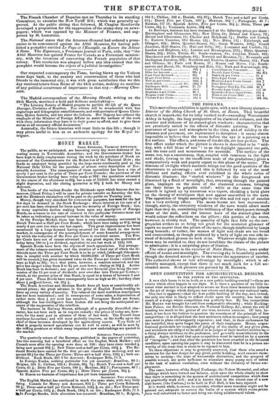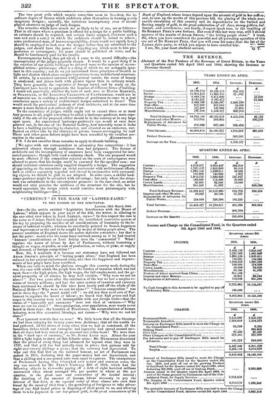OPEN COMPETITION FOR ARCHITECTURAL DESIGNS. TO THE EDITOR OF THE
SPECTATOR.
A new club-house is to be beat, or a new public building erected !—thcae are events which often happen iu our days. It is then a question of no little in- terest what method is best adapted to secure us front those lamentable failures in the art of design which disfigure our streets and disgrace our national taste_ Onefact is apparent—that the best publie building of the day, and, indeed, the only one that is likely to reflect credit upon trie country, has been the result of a design where competition was perfectly free. By free competition Mr. BARRY was brought forward from comparative obscurity ; while Bucking- ham Palace, the British Museum, the National Gallery, &c., attest the evil of trusting too much to the genius of one man, however eminent. Of late, in- deed, it has been the fashion to question the soundness of the principle of free competition : it is alleged that the best architects refuse to compete; that young men send in plans extravagantly expensive ; and that, in their enthusiasm for the beautiful, they quite forget the purse of their employers. Hence, unpro- fessional gentlemen are incapable of judging of the merits of any given plan, and architects are obliged to be called in as judges of their brother-architeets,— a thing always invidious to the profession, and generally unsatisfactory to the public. Again, it is said that open competition must be carried on by a system of "incognito "; and that after the premium has been awarded to the favoured candidate, upon opening his papers it may be discovered that he is a person un- worthy of the trust that is about to be reposed in him.
To these objections it may be generally answered, that those who award a premium for the best design for any given public building, need commit them- selves to nothing : the hope of honourable distinction, and the prospect of possible reward, are quite sufficient to stimulate many young men of talent to the task of zealous emulation, even without the certainty of future em- ployment. The cases, however, of the Royal Exchange, the Nelson Memorial, and other buildings which have turned out failures, seem upon the whole clearly to show that there is something in the system of architectural competition which does not practically work well: and it is known that in the recent case of a new club.house, (the Carlton,) to be built in Pall Mall, it has been rejected. It is worth while, however, to consider, whether some remedies might not be pointed out, adequate to correct the faults of A system which seems prima Jane well calculated to foster and bring out rising architectural talent.
The two great evils which require correction seem to be-first, the in- ordinate degree of licence which architects allow themselves in forming purely imaginary designs ; secondly, the notorious incompetency even of accom- plished amateurs to judge of such designs.
The remedies which have struck me as likely to be of use, are as follows- That in all cases where a premium is offered for a design for a public building, an estimate should be required, and certain limits assigned, (between such a sum and such a sum,) to which the architects should be bound to adhere: some professional man, of known respectability, (taste would not signify here,) should be employed to look over the designs before they are submitted to the judges, and should have the power of rejecting any which seem to him pre- posterous or extravagant ; his name should be published ab initio, and he should be handsomely paid for his trouble. Extravagancies being thus got rid of, I come to the second difficulty-the incompetency of the judges generally chosen. It would be a good thing if in the erection of our public buildings we deferred more to the opinion of accom- plished artiste: picturesque effect is a thing of which we are unhappily igno- rant in this country ; nor do we yet understand those principles of breadth in light and shadow which alone can give importance to any architectural structure. In artists, by a constant converse with:external nature, the sense of beauty is awakened, and shines forth with greater vigour than in ordinary minds. They have generally the experience of foreign travel, and by study on the Continent have learnt to appreciate the beauties of different forms of building. I would ask practically, whether the taste of such men as DAVID ROBERTS, Or STANFIELD, Or Sir AUGUSTUS CALLCOTT, Or CATTERMOLE, Would not be of material use in enabling a small committee of gentlemen to come to a just conclusion upon a variety of architectural designs submitted to them ? This would avoid the professional jealousy of rival architects, and at the same time secure a more finished and correct style of art. To the committee of judges, which ought not to exceed three or at most four persons in all, might sometimes be added a landscape-gardener, more espe- cially if the site of the proposed edifice should be in the country or in any large open space. An experienced landscape-gardener's eye would at once have pointed out, in the case of the National Gallery, how miserably mean it looks to have a building pretending to character, and situated on an eminence, out- flanked on either Bade by the chiennies of private houses overtopping its roof. These and other gross defects might have been remedied by the smallest pre- (We agree with our correspondent in advocating free competition : it has miscarried oftener through unfairness than bad judgment. The licence of architects and the incompetency of amateurs have been exaggerated for inte- rested purposes ; though both need a salutary check. The one proposed would be more efficient if the competitor rejected on the score of extravagance were allowed to prove that his design could be executed for the specified sum : nor should technical omissions easily supplied disqualify a design. The suggestion of appointing on the committee an artist conversant with architectural effects, both in edifices separately regarded and viewed in conjunction with surround- ing objects, we should be glad to see adopted. In some cases, a skilful land- scape-gardener might be consulted with advantage; but only where the struc- ture was subordinate to the circumjacent grounds : in the case cited, an artist would not only perceive the unfitness of the structure for the site, but he would appreciate the design which would combine most picturesquely with neighbouring buildings.-ED.)



























 Previous page
Previous page